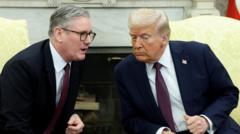Will the US Pay Attention to the UK's Clear Stance on Iran?

Understanding the UK's Position Amidst US-Iran Tensions
In the complex landscape of international relations, the recent military actions taken by the United States against Iran have ignited a wave of discussions, particularly concerning the United Kingdom's stance. As the UK navigates its diplomatic relationships, the Prime Minister's conversations with President Trump reveal both the intricacies and the challenges of aligning national interests with global security. This article delves into the nuances of the UK's position regarding the US-Iran conflict, examining the implications of the recent military actions, the diplomatic efforts undertaken, and what lies ahead for British foreign policy.
The Context of Recent Events
The backdrop of the current situation involves escalating tensions between the United States and Iran, particularly surrounding Iran's nuclear program. The US has taken a hardline approach, aiming to prevent Iran from developing nuclear weapons, which has led to military strikes and calls for a more aggressive stance against Tehran. The UK, however, has found itself in a delicate position, advocating for de-escalation while simultaneously grappling with the implications of US actions.
Communication Between the UK and US
Following the US strikes, Prime Minister's discussions with President Trump were pivotal. While the UK government was informed of the US's intentions, it was not asked to participate directly in the military actions. This lack of direct involvement raises questions about the UK's influence and its role in international military engagements. The absence of a request for UK military support, particularly regarding the use of Diego Garcia as a base for US operations, suggests a strategic distancing from the US's aggressive stance.
The UK’s Diplomatic Efforts
The UK government, led by Foreign Secretary David Lammy, has been proactive in fostering diplomatic relations. Meetings with the foreign ministers of France, Germany, and Iran indicate a commitment to dialogue. The UK’s stance is clear: it seeks a diplomatic resolution to the crisis, advocating for negotiations rather than military escalation. This approach aligns with the broader European perspective, which emphasizes the importance of diplomatic channels over military interventions.
Challenges of a Binary Decision
The UK’s position is complicated by the need to maintain a strong relationship with the United States while also addressing its own foreign policy objectives. Given the historical context and the current geopolitical climate, agreeing to support US military actions could have significant ramifications for the UK’s global standing. Conversely, a refusal could alienate a key ally, complicating future cooperation.
The Conservative Party’s Critique
Within the UK, the Conservative Party has criticized the government’s approach as equivocation and moral cowardice. This internal dissent highlights the tensions between differing political ideologies regarding national security and foreign policy. The Conservative perspective underscores a belief in a more assertive stance against Iran, reflecting a broader concern about the implications of a nuclear-armed Iran for global security.
Future Diplomatic Efforts
In light of the recent military actions, the UK’s diplomatic initiatives will be crucial in navigating the fallout. The government's emphasis on encouraging Iran to engage in direct talks with the US is indicative of a desire to pivot towards diplomacy. However, Iran’s refusal to negotiate while under military pressure complicates the landscape. The UK’s ability to act as a mediator will depend on its relationships with both Iran and the US, as well as its capacity to advocate for a peaceful resolution without compromising its own security interests.
Implications for NATO and Global Security
With the NATO summit approaching, discussions among Western leaders, including Prime Minister Johnson and President Trump, will likely center on strategies for addressing the Iranian threat. The UK’s position will be scrutinized, and there is an opportunity for the government to reinforce its commitment to a diplomatic resolution while balancing the demands of its allies. The outcomes of these discussions could significantly influence the future trajectory of UK foreign policy regarding Iran.
Conclusion: The Path Forward for the UK
The UK's approach to the US-Iran conflict is characterized by a commitment to diplomacy, even as it navigates the complexities of its relationship with the United States. As the situation unfolds, the government will need to remain vigilant, balancing its foreign policy goals with the realities of international power dynamics. The call for a diplomatic solution is more pressing than ever, and the choices made by UK leaders in the coming weeks will shape the nation's role on the global stage.
FAQs
What is the UK's current stance on the US-Iran conflict?
The UK advocates for a diplomatic solution and has not endorsed the US's military actions against Iran, emphasizing the importance of dialogue over conflict.
How has the UK government responded to the US's military actions?
The UK was informed of the US's plans but was not involved in the military strikes. The government is focused on encouraging diplomatic negotiations.
What are the potential risks of the UK's position?
The UK risks straining its relationship with the US if it appears to oppose American military actions, while also facing criticism domestically for not taking a stronger stance against Iran.
As the geopolitical landscape continues to evolve, what do you think should be the UK's primary focus in its foreign policy regarding Iran? #UKForeignPolicy #USIranRelations #DiplomaticSolutions
Published: 2025-06-22 23:36:06 | Category: technology



